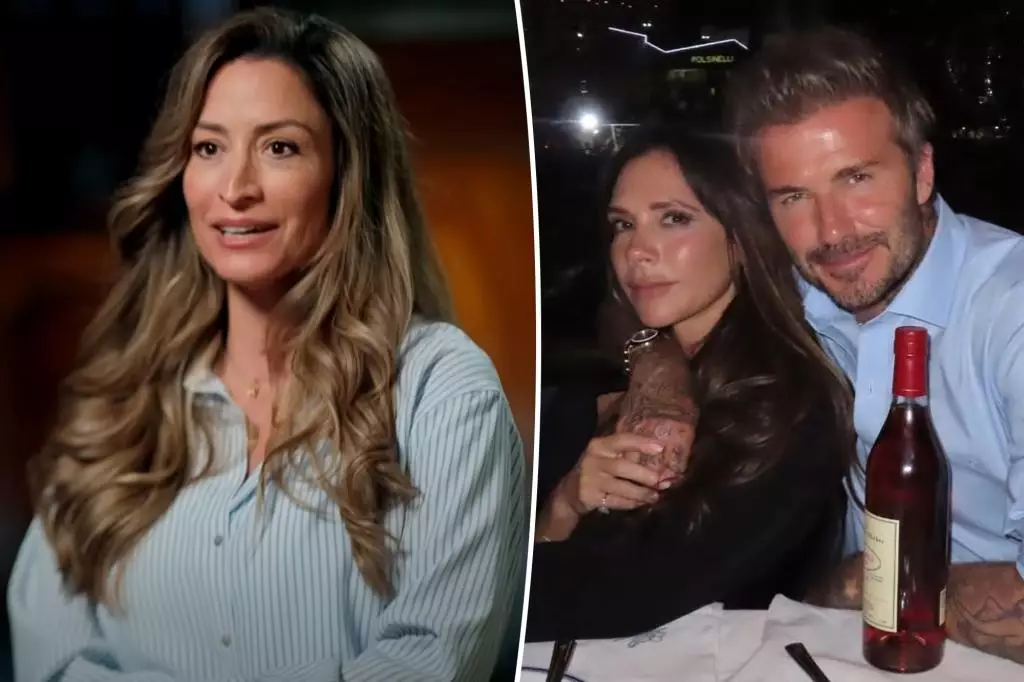In the realm of celebrity culture, few stories capture public fascination quite like that of Rebecca Loos and David Beckham. Even nearly two decades after the alleged affair that rocked Beckham’s marriage to Victoria Beckham, the ghost of that scandal continues to linger, igniting fresh debates and interest. During a recent interview on “60 Minutes Australia,” Loos opens a window into her complicated emotions regarding this episode, suggesting that the past is hardly a faded memory for her. Body language expert Judi James notes how Loos still speaks of Beckham in the present tense, indicating an unresolved attachment that complicates her narrative.
The body language nuances suggest a dichotomy—between vulnerability and bravado. While Loos affirms her account and frames herself as a victim of circumstance, the lingering warmth in her recollections of Beckham indicates that the emotional weight of that transient romance has not quite left her. Speaking to both the thrill of the affair and the fallout, she articulates her perspective in a manner that invites empathy, and yet, the psychological impact of rehashing such a fraught narrative is tangible.
Through the Lens of Media Scrutiny
The celebrity ecosystem thrives on scandal; it is the lifeblood that feeds tabloids and social media chatter. A significant part of what makes the Loos-Beckham saga endure is the surrounding media circus, which both fuels and complicates personal narratives. Victoria Beckham’s reflections on her marriage during that tumultuous time—a time she describes as the “most unhappy” of her life—adds further layers to this already intricate tableau. Through her candor, Victoria offers a glimpse not only into her emotional state but also highlights the isolation and pressure that accompanies life under the public eye.
In this context, Rebecca Loos’ claims of bravery for speaking her truth take on a double-edged character. Presenting her experience as an act of defiance against a “strongest, most powerful couple in the media” implies that she sees herself not just as a participant in a fleeting romance but as a player in a larger narrative of power dynamics. The reality surrounding public figures often complicates their personal narratives; they become entwined with media perceptions, public judgment, and the endless cycle of gossip. This speaks volumes about how perception can warp or validate personal experiences.
Emotional Vulnerability and Its Implications
Loos’ choice to appear with minimal makeup, as noted by Judi James, is telling in itself. It communicates a willingness—or even a necessity—to strip away layers of artifice in order to present her most authentic self. Yet, this yearning for vulnerability juxtaposes her combative stance regarding the allegations. While she invites sympathy through her expressions of sadness, referencing “darkness” and “loneliness,” there is an undercurrent of defiance in her articulations. By openly discussing the potential for tears beside casual statements over a milkshake, she blends the trivial with the profound, encapsulating the conflicting emotions she experiences as she paradoxically strives for both recognition and respect.
This display of emotional complexity resurfacing brings light to the ongoing impacts of past trauma—not merely for the individual involved but also for the families intertwined within these narratives. David and Victoria Beckham’s four children, who have grown up amid this scandalous backdrop, likely bear psychological burdens stemming from the media’s relentless scrutiny of their parents’ lives. The intergenerational effects of public disputes in families, particularly those in the limelight, challenge the notion of “getting over” an event and serve as poignant reminders that healing is rarely linear.
Truth as a Contested Terrain
Loos emphatically claims that she “never exaggerated” anything about her relationship with Beckham, framing her narrative as one anchored in truth. However, the term ‘truth’ can be subjective, colored by personal emotions and perceptions. Whether or not an affair occurred, what remains is the undeniable emotional strife that this chapter has inflicted upon all parties involved. It illustrates the often convoluted nature of personal truth, particularly when placed in the unforgiving light of public scrutiny.
While this media narrative serves as entertainment for many, it poses significant ethical questions surrounding privacy, consent, and the ramifications of fame. As we revisit tales like Loos and Beckham’s, we arguably owe it to ourselves to explore the underlying complexities rather than simply consume the drama. The intricate dance between public personas and private lives necessitates a critical examination—one that acknowledges the emotional wreckage left in the wake of scandal and the very real struggles faced by those at its center.

